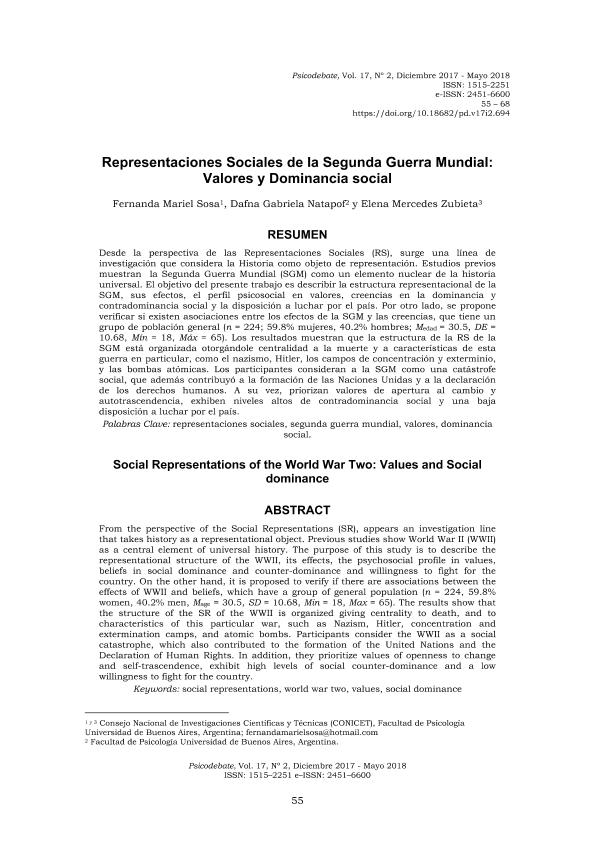Mostrar el registro sencillo del ítem
dc.contributor.author
Sosa, Fernanda Mariel

dc.contributor.author
Natapof, Dafna Gabriela
dc.contributor.author
Zubieta, Elena Mercedes

dc.date.available
2019-04-10T14:40:35Z
dc.date.issued
2017-12
dc.identifier.citation
Sosa, Fernanda Mariel; Natapof, Dafna Gabriela; Zubieta, Elena Mercedes; Representaciones Sociales de la Segunda Guerra Mundial: Valores y Dominancia social; Universidad de Palermo; Psicodebate; 17; 2; 12-2017; 55-68
dc.identifier.issn
2451-6600
dc.identifier.uri
http://hdl.handle.net/11336/73937
dc.description.abstract
Desde la perspectiva de las Representaciones Sociales (RS), surge una línea de investigación que considera la Historia como objeto de representación. Estudios previos muestran la Segunda Guerra Mundial (SGM) como un elemento nuclear de la historia universal. El objetivo del presente trabajo es describir la estructura representacional de la SGM, sus efectos, el perfil psicosocial en valores, creencias en la dominancia y contradominancia social y la disposición a luchar por el país. Por otro lado, se propone verificar si existen asociaciones entre los efectos de la SGM y las creencias, que tiene un grupo de población general (n = 224; 59.8% mujeres, 40.2% hombres; Medad = 30.5, DE = 10.68, Mín = 18, Máx = 65). Los resultados muestran que la estructura de la RS de la SGM está organizada otorgándole centralidad a la muerte y a características de esta guerra en particular, como el nazismo, Hitler, los campos de concentración y exterminio, y las bombas atómicas. Los participantes consideran a la SGM como una catástrofe social, que además contribuyó a la formación de las Naciones Unidas y a la declaración de los derechos humanos. A su vez, priorizan valores de apertura al cambio y autotrascendencia, exhiben niveles altos de contradominancia social y una baja disposición a luchar por el país.
dc.description.abstract
From the perspective of the Social Representations (SR), appears an investigation line that takes history as a representational object. Previous studies show World War II (WWII) as a central element of universal history. The purpose of this study is to describe the representational structure of the WWII, its effects, the psychosocial profile in values, beliefs in social dominance and counter-dominance and willingness to fight for the country. On the other hand, it is proposed to verify if there are associations between the effects of WWII and beliefs, which have a group of general population (n = 224, 59.8% women, 40.2% men, Mage = 30.5, SD = 10.68, Min = 18, Max = 65). The results show that the structure of the SR of the WWII is organized giving centrality to death, and to characteristics of this particular war, such as Nazism, Hitler, concentration and extermination camps, and atomic bombs. Participants consider the WWII as a social catastrophe, which also contributed to the formation of the United Nations and the Declaration of Human Rights. In addition, they prioritize values of openness to change and self-trascendence, exhibit high levels of social counter-dominance and a low willingness to fight for the country
dc.format
application/pdf
dc.language.iso
spa
dc.publisher
Universidad de Palermo
dc.rights
info:eu-repo/semantics/openAccess
dc.rights.uri
https://creativecommons.org/licenses/by-nc-sa/2.5/ar/
dc.subject
Representaciones Sociales
dc.subject
Segunda Guerra Mundial
dc.subject
Valores
dc.subject
Dominancia Social
dc.subject.classification
Psicología

dc.subject.classification
Psicología

dc.subject.classification
CIENCIAS SOCIALES

dc.title
Representaciones Sociales de la Segunda Guerra Mundial: Valores y Dominancia social
dc.title
Social Representations of the World War Two: Values and Social dominance
dc.type
info:eu-repo/semantics/article
dc.type
info:ar-repo/semantics/artículo
dc.type
info:eu-repo/semantics/publishedVersion
dc.date.updated
2019-04-09T20:27:11Z
dc.journal.volume
17
dc.journal.number
2
dc.journal.pagination
55-68
dc.journal.pais
Argentina

dc.journal.ciudad
Buenos Aires
dc.description.fil
Fil: Sosa, Fernanda Mariel. Consejo Nacional de Investigaciones Científicas y Técnicas; Argentina. Universidad de Buenos Aires. Facultad de Psicología; Argentina
dc.description.fil
Fil: Natapof, Dafna Gabriela. Universidad de Buenos Aires. Facultad de Psicología; Argentina
dc.description.fil
Fil: Zubieta, Elena Mercedes. Consejo Nacional de Investigaciones Científicas y Técnicas; Argentina. Universidad de Buenos Aires. Facultad de Psicología; Argentina
dc.journal.title
Psicodebate
dc.relation.alternativeid
info:eu-repo/semantics/altIdentifier/doi/https://doi.org/10.18682/pd.v17i2.694
dc.relation.alternativeid
info:eu-repo/semantics/altIdentifier/url/http://ref.scielo.org/pn6423
dc.relation.alternativeid
info:eu-repo/semantics/altIdentifier/url/https://dspace.palermo.edu/ojs/index.php/psicodebate/article/view/694
Archivos asociados
